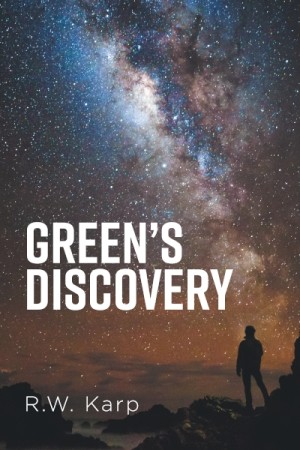Green's Discovery
Green’s Discovery is, in some ways, the ultimate fantasy: a group of all-powerful aliens arrive, able and willing to fix every major problem on Earth.
Alien visitors transform Earth into a proto-utopia in R. W. Karp’s science fiction novel Green’s Discovery.
Dr. Green spent his whole life searching for proof of extraterrestrials. When he does find it, the aliens aren’t at all what he imagined. Tasked with helping the visitors guide Earth to a brighter future, Green travels the world, witnessing and resolving humanity’s worst problems with the ultimate goal of allowing Earth to take its place among other peaceful worlds.
Green is conflicted when he discovers the aliens’—or, as he calls them, the visitors’—presence. His joy, triumph, and vindication are tempered by a sense of foreboding about what the visitors might want. Later, he is overcome with sorrow and self-recrimination upon realizing the extent of the world’s problems and the fact that he never did anything to solve them. Through it all, he remains determined to do the right thing for humanity.
Green’s Discovery is, in some ways, the ultimate fantasy: a group of all-powerful aliens arrive, able and willing to fix every major problem on Earth. It is also a rebuke of the current world order, which is too selfish and greedy to improve Earth on its own, despite having the ability to do so. The visitors express disgust with the ruling class’s entitlement and their habit of interfering with other cultures, regardless of those cultures’ wants and needs. Yet, despite Green’s repeated assertions that the visitors are doing the right thing, they seem no different from the despised elites: they seize political and technological control of humanity, and they threaten to exile anyone who doesn’t cooperate. The story does not engage with this parallel, glossing over problems with, and questions about, the visitors’ methods. The irony is nonetheless compelling.
Green’s visits all follow a similar pattern; they become repetitive. Expository prose and long, redundant speeches dominate the narrative. Conversations are stiff, and some repeat what the prose has already expressed. Minor continuity issues are present throughout.
The story sticks close to Green and his sister, Joy, who helps to execute the visitors’ agenda. This allows deeper insight into Green’s shifting mindset, but minimizes opportunities to see the fruits of his global labors. It also keeps the visitors at a distance, ensuring they remain a mysterious, inscrutable presence hovering over Earth.
All ends on a satisfactory note, though leaving questions to be addressed in the next installment. Its wish-fulfillment elements are in some ways cathartic, but the visitors’ velvet-gloved ruthlessness keeps it from fully cohering.
In the novel Green’s Discovery, aliens arrive, prompting examinations of human responsibility toward other humans, and raising questions about what the world might look like if it were bettered.
Reviewed by
Eileen Gonzalez
Disclosure: This article is not an endorsement, but a review. The publisher of this book provided free copies of the book and paid a small fee to have their book reviewed by a professional reviewer. Foreword Reviews and Clarion Reviews make no guarantee that the publisher will receive a positive review. Foreword Magazine, Inc. is disclosing this in accordance with the Federal Trade Commission’s 16 CFR, Part 255.

